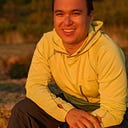Over the hills and through the creek
John looked down at the crystal clear water and felt it pulling the heat away from his body already. He slid his toes into the water stifled a cry at the stinging cold from being out of his boots. He gritted his teeth and felt his way to the bottom and came into contact with the jagged surfaces of the rocks. He was going to have to wear his boots. There was no other way.
He pulled his socks back on and laced up his boots. The last time he got them wet was on a river crossing and it took five days for them to feel completely dry. His feet begged him not get his boots wet again. The distant barking begged to differ with his feet. John held his pack over his head and plunged into the cold clear river. He started moving against the current.
A day ago he had been hiking solo in the back country of Idaho. John came across a camp of five men, their dogs, and their captive who was in shackles. John had stayed quiet and hidden beyond the edge of their camp. He listened to the men talking and realized that they intended to free their captive and hunt him down.
Once John heard what they were going to do he picked up his pack and started moving away from the camp. He avoided fallen branches and picked his feet up high to avoid disturbing the fallen leaves. The next morning he heard the dogs yipping in the distance.
John’s friends had told him he was impossible to go hiking with due to how fast he moved on the trails. When he heard the dogs behind him his hair stood on end and he picked up his pace. He was already in the back country so there were no trails, but he moved towards lower ground.
He wasn’t sure that they were after him. But yipping dogs in the distance either meant the captive had headed in his direction or they had picked up his scent. He kept up his pace for the whole day and the large creek he had passed the day before came into view just as the sun set. John had woken to the dogs sounding even closer and it was then he decided to make the cold plunge to try and lose his scent.
The frigid water came up to his chest and already he felt his body parts going numb. He passed between the fissure in the rock when his body started to shiver. John hoped that either the man who was getting hunted wouldn’t go up stream of the frigid water or that the dogs would lose his scent.
John undid his handkerchief around his neck and placed it in the water. The current took it out of sight and perhaps it would be enough to confuse the dogs in his direction. John forced himself to breathe deeper as he got colder. When he was a kid him and his cousins used to see who could stay in the pool during October. John had figured out early that it was the person who controlled their breathing that usually won.
John filled up his water bottles and clambered up out of the cold water. He could barely feel the burning in his legs and he didn’t feel his feet at all. John buckled the straps on his backpack and started back up with his brutal pace. It had taken him three days to reach the ill fated camp, but he was resolute to get out in two.
By that night he didn’t hear any barking or yipping from the dogs. The next morning when he was having breakfast all he could hear were birds and insects. The adrenaline started to fade. By the afternoon he came to the road that he come in on and started heading East to where his car.
The engine hummed to life and Creedence Clearwater Revival came on the radio. John sped off down the road and the image of the camp and the man in shackles wouldn’t leave his mind. He doubted it ever would leave him as his body cried out that it needed a proper rest on his vacation at some point.
If you liked this please give me a follow Anthony Maiorana, hit that heart button, or let me know why you didn’t like it in a comment below. Thanks for reading.
